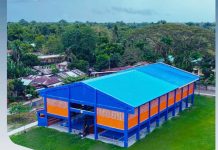TACLOBAN CITY- From a recent study conducted by the National Maritime Polytechnic (NMP), a government maritime training and research agency located at Brgy. Cabalawan, this city, it revealed that 82% of its seafarer-trainees are easily absorbed into sea-based jobs after completion of their training and 84% of them have jobs related to skills acquired. These employability-related data of NMP graduates were taken from the research study completed in 2014 by the NMP Maritime Research Section entitled “Tracer Study of NMP Graduates, 2007-2011.”
The said study, aimed at determining the impact of NMP training to the employability of its graduates, also established and compared the profile of graduates from 2007-2011 ‘before’ and ‘after’ training at NMP. It showed that most of the seafarers undergoing training at NMP are males, pegged at 98%. About 63% of these graduates are single; only 35% are married. Most of them come from the Visayas regions where 48% are from Region VIII and 28% are from Region VII. In the educational attainment profile, 37% of them are Bachelor of Science in Marine Transportation (BSMT) graduates. Only about 15% are Bachelor of Science in Marine Engineering (BSMarE) graduates.
The study also revealed that before undergoing training there was only about 14% of the seafarer-trainees who have licenses and 48% of them are employed. After training at NMP, 33% have already secured licenses and about 90% are employed. The said study is a follow-up research undertaking conducted in 2007 which also established the profile of NMP graduates during training from 2003 to 2006; determined the knowledge and skills acquired by NMP graduates from every training course and the graduates’ employment, absorption and skills utilization rates, employment mobility in terms of progression in license and rank; and identified the benefits obtained by graduates from training courses taken at NMP. In comparison of the findings of the tracer studies between 2007 and 2014, data revealed that the latter tracer study shows improved employment-related outcomes compared to the 2003-2006 graduates.
There is an increase in the skills utilization rate at 8%. Skills utilization rate refers to the percentage of employed graduates in a given period whose jobs are related to skills acquired.
Absorption rate has also increased at 6% from 76% to 82%, respectively. Absorption rate is defined as the percentage of certificated trainees who got a sea-based job after completion of training to the number of graduates who were not employed prior to completion of training. With the present study, the NMP Maritime Research Section plans to embark on continued and more comprehensive conduct of similar tracer studies to determine the progression rate of employability-related data of NMP graduates and the relevance and importance of the trainings offered by NMP to the requirements of the industry. (PR)



